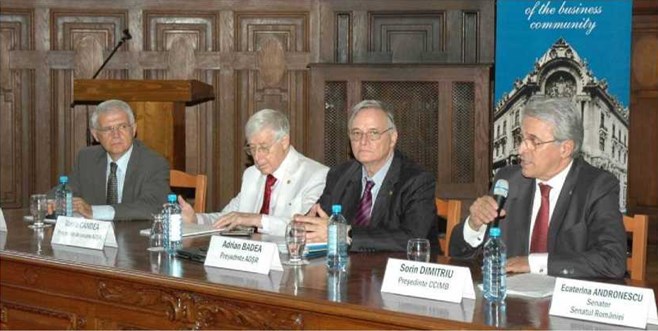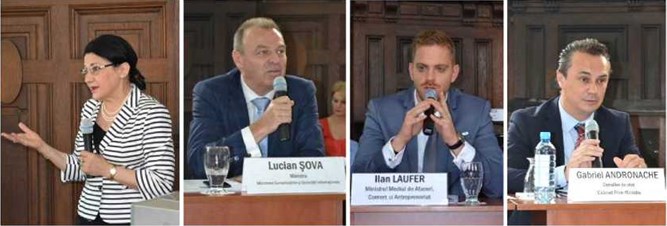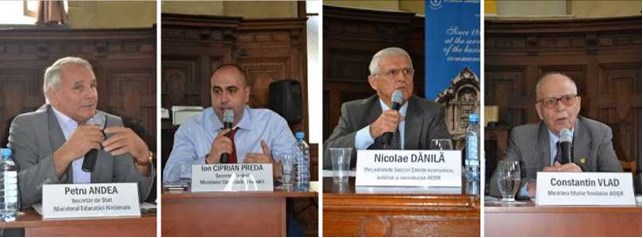On 12 July 2017, under the auspices of the Academy of Romanian Scientists, the debate “THE ROLE OF SMALL AND MEDIUM-SIZED ENTERPRISES IN THE DEVELOPMENT OF THE ROMANIAN ECONOMY” took place in the Carol I Hall of the Bucharest Chamber of Commerce and Industry.
The event – the second event of the “AOSR Debates” Project – focused on a topic of major importance for the Romanian economy and society: SMEs.

The debate, moderated by Prof. Dr. Ing. Adrian Badea, President of the Academy of Romanian Scientists, brought together a select participation of representatives of the Romanian Government and Parliament, central government, business and banks, economic, financial, education and research officials, policy and decision makers, members of academia, scientific researchers, experts in economic policies and strategies, civil society representatives, academics, etc.
According to Article 2 of the Annex of Recommendation 2003/361/EC (assimilated into Romanian law by OG nr. 27/2006, M. Of. nr. 88/31.01.2006, approved by Law nr. 175/2006, M. Of. nr. 438/22.05.2006), “The category of Micro, Small and Medium-Sized Enterprises (SMEs) consists of enterprises which employ fewer than 250 persons and which have an annual net turnover of up to EUR 50 million and/or total assets of up to EUR 43 million”. Through their dynamism, flexibility, adaptability to the needs of the economy and society, modern entrepreneurship and innovation capacity, SMEs play a key role in the development of the Romanian economy within the European Union and the contemporary world.
Given their status as vectors of development, modernisation and innovation in the economy and the socio-economic environment as a whole, support for SMEs must be a priority for any government, regardless of political colour. In order to operate at European standards of efficiency and effectiveness, SMEs in Romania need a legislative framework in line with European Union legislation, strategies, policies, programs and financing solutions, administrative conditions conducive to carrying out their activities in accordance with their economic mission, in an economy in full process of development and modernization, as is the Romanian economy.
Within this framework, a topic that requires careful analysis in order to promote solutions is the realistic x-ray, made by experts, scientific researchers and elite professionals, of the SME sector in Romania, highlighting the difficulties and obstacles of a legislative, political, financial and administrative nature that they face in their activity. The 2016 White Paper on SMEs in Romania, based on the consultation of more than 1000 economic agents, highlighted the most important difficulties faced by their managers: bureaucracy (61.41% of SMEs), excessive taxation (54.74%), corruption (45.16%), excessive controls (44.98%), unfair competition (40.33%), decreasing domestic demand (36.31%), hiring, training and retaining staff.
The debate “The role of small and medium-sized enterprises in the development of the Romanian economy” focused on the following topics:
– government policies and programmes in support of SMEs;
– research and innovation in support of SME development;
– education to promote entrepreneurship;
– a well-trained workforce – an essential factor for economic development;
– difficulties and challenges of the Romanian business environment.
Expectations and requirements;
– economic diplomacy – an essential activity to promote the Romanian economy;
– financing solutions for SMEs.
The discussions, which brought together the most important state institutions with authority and responsibility in the field of SMEs, were conducted at a high level of competence, professionalism and expertise by ministers, secretaries of state, parliamentarians, experts, bankers, scientific researchers and university professors.
Among those who were actively involved, with substantial interventions, in the exchange of ideas were:
– prof. dr. eng. Ecaterina Andronescu, Senator, Chair of the Senate Education Committee,
– Lucian Sova, Minister of Communications and Information Society,
– Ilan Laufer, Minister for Business, Trade and Entrepreneurship,
– Gabriel Andronache, State Counsellor, Government of Romania,
– prof. dr. eng. Petru Andea, Secretary of State, Ministry of National Education,
– Ion Ciprian Preda, State Secretary, Ministry of Research and Innovation,
– Sterică Fudulea, State Secretary, Ministry of Business, Trade and Entrepreneurship,
– prof. dr. eng. Sorin Dimitriu, President of the Bucharest Chamber of Commerce and Industry,
– Alexandru Cumpănașu, president of the National Coalition for the Modernization of Romania,
– Prof. Nicolae Dănilă, President of the Economic, Legal and Sociological Sciences Section of AOSR,
– Dragoș Radu Drăghici, Director, SME Department, Alpha Bank Romania,
– Florin Dănescu, Executive President, Romanian Association of Banks,
– Doina Topală, Director, SME Directorate CEC Bank,
– Daniel Szekely, Director, SME and Microbusiness Department, Banca Transilvania,
– ambassador Prof. Constantin Vlad, founding full member of AOSR.
Stating that SMEs are the “backbone of the economy”, Professor Adrian Badea, President of AOSR and moderator of the debate, pointed out that the number of SMEs in Romania and their productivity is half of what it is in the European Union. This is why the number of micro-, small and medium-sized enterprises needs to increase to 670,000 by 2020 (from 500,000 today) and, by then, to reach 3,250,000 employees in SMEs (now 2,000,000).

Prof. dr. eng. Ecaterina Andronescu presented the new model of industry, which is developing in the world, especially in Germany, the economic engine of the EU, “Industry 4.0”, which puts equipment, systems and people in complex communication relationships, with the support of digital technology, in an advanced formula of cyber-systems, a model in which Romanian SMEs should also develop. In today’s rapidly evolving technology, increasing supply and demand, social needs and market volatility, and decreasing product lifecycles, there is a need for competent people working in interdisciplinary teams. Hence, the role of higher education, the need to develop young people’s creativity and capacity for innovation – a concern put into action through specially designed programs and projects at the Polytechnic University of Bucharest.
Minister Lucian Sova referred to the fact that SMEs have a very high economic potential and that, under these conditions, strategies and ways forward are needed to develop this sector in Romania. For its part, the Ministry of Communications and Information Society is developing programmes aimed at stimulating innovation, encouraging innovative products. Minister Ilan Laufer said that the Ministry of Business, Trade and Entrepreneurship is preparing a package of laws, which include: Public-Private Partnership Law, Prevention Law, Lobby Law, through which he aims to create a modern and flexible legislative framework, a competitive, pleasant, supportive business environment for entrepreneurial initiatives.
State Secretary Petru Andea spoke about the important role of education in the training of human resources in SMEs, about the need for schools to take steps forward in the Digital Age, as digitisation increasingly encompasses the field of industry. Stressing the need for a new education law, which would create the framework for ongoing developments and transformations, Professor Andea stressed that, at national level, we must move from Educated Romania (the project initiated by the Romanian Presidency), i.e. from what we know, to Competent Romania, what we know how to do. In other words, Romania’s economy, in particular the large SME sector, needs qualified and competent human resources.

State Secretary Ion Ciprian Preda, starting from the reality that digitization is a current “hot topic”, said the need to transfer innovation from the public to the private sector, to transfer technology from the research area to the entrepreneurial one, which is currently deficient. A zero priority, he added, is to keep the research funding axes on schedule and catch up on the backlog.
Professor Nicolae Dănilă stressed that the Romanian economy needs a balanced development model, a friendly business environment and, in this framework, SMEs can be an important lever in attracting funds.
Ambassador Constantin Vlad criticized the fact that the Romanian economic diplomacy is today in a critical situation, being far from what it should be and what it could do for the economic promotion of Romania abroad, for attracting foreign investors, for facilitating international collaborations, partnerships and projects towards the economic development of the country, as it happened in the recent past.
Prof. dr. eng. Sorin Dimitriu pointed out that in the entrepreneurial sector, there are problems at the level of the culture of representativeness, in the sense that Romanian SMEs do not participate or participate in small numbers in the projects of the Chamber of Commerce and Industry of Bucharest, in which only foreign firms take part, a dangerous phenomenon for the development of the Romanian business environment. The most important ideas formulated during the discussions and the conclusions of the debate will be drafted in a final document, which will be submitted to the state institutions with authority in the field of SMEs, as a support for future initiatives necessary for the development of this sector of fundamental importance to the Romanian economy.
The debate “The role of small and medium-sized enterprises in the development of the Romanian economy” is part of the “AOSR DEBATES” project, initiated by the Academy of Romanian Scientists in 2016, through which the institution aims to hold a series of meetings and discussions, with the participation of policy makers, decision makers, representatives of academic, professional and educational circles, scientists, researchers, experts, students, members of civil society, etc., on topics of priority interest for Romania today and for the future of the country. Through the “AOSR Debates” project, the organizing institution intends to constitute an agora of public and academic personalities, of representatives of Romanian society in its diversity, a space for dialogue on major issues, ideas and solutions and, last but not least, a framework for dialogue between generations. The fundamental objective of the Project is to create an academic, scientific, cultural and civic forum in which to identify and promote solutions for the development and affirmation of Romania in the European Union and the world.

